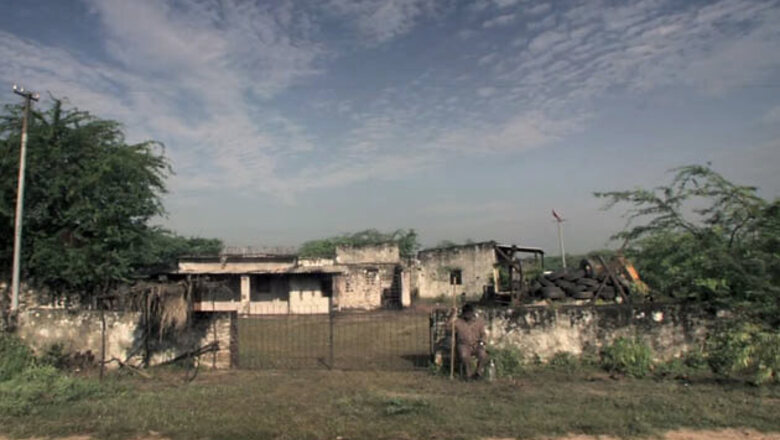
views
Cast: Dibyendu Bhattacharya, Saba Joshi, Avatar Sahani, Rupinder Walia, Geeta Bisht, Manav Kaushik
Director: Sidharth Srinivasan
Land politics has always been a life affecting thing in Delhi-NCR but it never received many mentions on the silver screen as a topic. ‘Khosla Ka Ghosla’ touched the subject in a funny manner and now ‘Pairon Talle’ has come up with an analysis of the aftereffects of being neo-rich through land deals.
A poor watchman Bhanu (Divyendu Bhattacharya) is at the helm of affairs in ‘Pairon Talle’ (Soul of Sand). Bhanu’s devotion towards his master Lakmichand Ahlawat (Avatar Sahani) and his barren Royal silica mine is exceptional; it has touched such a level that he has lost all sense of his own family’s protection. Ahlawat wants to marry his daughter to an influential and rich man Dahiya who has promised to buy his useless silica mine. Ahlawat’s daughter Twinkle (Geeta Bisht) runs away with her boyfriend when she comes to know that Dahiya is at least 30 year older to her. Ahlawat gets Twinkle’s boyfriend killed but he pays a heavy price for it.
The film doesn’t follow any set pattern. It showcases several perspectives with the silica mine as the common premise. The watchman Bhanu and his wife Saroj (Saba Joshi) don’t know anything other than obeying their master’s orders, even it comes down to being sexually exploited. Saroj is a complex lady who agrees to bed Ahlawat to make the ends meet, but wants her husband to take a stand against Ahlawat. Saba Joshi has given a good performance, her helplessness is disturbing, the complete loss of emotions on her face in some of the scenes strikes the audiences. The writer has tried to give a bit of her background through dialogue but what makes her character authentic is Joshi’s understanding of the multi layered structure of the film. She never loses her basic nature and brings out the brutality of the circumstances through her gestures.
Divyendu is good in shots where he needs to showcase the anguish of his character through facial expressions. In a sequence where he is drinking with Constable Chattar Bitta (Rupinder Walia), Divyendu shows a range of emotions. However, the intricacies of the script restrict him to some extent as an actor. The film’s dependence on Ahlawat’s character hampers the chances of Divyendu’s character’s complete growth.
For example, the director hasn’t given solid reasons of him not turning against his master despite the availability of jobs in the same vicinity (Chattar Bitta points this out in the film). Further, his acceptance of the truth in the end suggests that he was silent till now due to some reason and the only reason that the director has given is his familial loyalty to Ahlawats. Why would a watchman pay on behalf of his master if the master reluctantly returns the ‘obligatory’ money!
Chattar Bitta’s sudden change of character is not properly explained. Probably a person so neck deep in corruption like Bitta needs serious personal jolt before changing overnight. Rupinder Walia gets across the grey shades and that is his success as an actor. He is particularly good in the scene where he and Bhanu get drunk, his careless dancing is funny but conveys the point. In fact, he only describes the theme of the film, blind urbanisation of the National Capital Region.
Avatar Sahani doesn’t impress initially but gets better towards the end. His language is fine, dialect is ok, but a lack of conviction is also there. He is shrewd and brutal but doesn’t get emotional easily, even when he is required to do so.
The overall narrative strategy is good but some high points were needed to give more screen space, like the scene where Ahlawat gets angry on Saroj and both indulge in a physical fight, Ahlawat seems to be reacting even before the reason sinks in properly. Similarly, the climax suggests the opening of silica mine to everyone, but why, who will enter the mine, whose benefits Bhanu intended?
More than any actor or theme, ‘Pairon Talle’ belongs to director Sidharth Srinivasan’s style of saying a story through metaphors. Not a single Delhi landmark has been featured in the film; the locales are eerie and sinister. Those who know Delhi-NCR would immediately catch the dark vibes. Manav Kaushik as a killer is handled carefully. He is menacing and sends a chill down the spine but his long dialogues sometimes bring down his weight.
Srinivasan creates the terror of being an unarmed man in the land of wolves with ease. In a visually shocking scene, Divyendu dreams about his master blessing him with a rotten hand, it speaks a lot about the conflicts between the reality and fantasies. A corpse replaces the scarecrow, ‘R’ of ‘Royal Silica Mine’ oscillates in air, a stranger puts his blood stained hand on the wall, almost every metaphor works.
The objectivity with which Srinivasan has shown the barren lands of NCR is praiseworthy; thanks to his vision the story never becomes the tale of spoilt brats of the la la land.
One more remarkable thing about ‘Pairon Talle’ is that it remains a dark film with morally ambiguous characters rather than turning into a docudrama against mindless development. ‘Pairon Talle’ gives the spectators a story that is brutal, visually appealing and tactfully told.
One may find the acting part a bit theatre inspired but the emptiness ‘Pairon Talle’ invokes is worth experiencing.
The judicious framing helps the camera in emerging as another auteur. Landscapes are perfectly created and recreated. The film gives a voyeuristic feeling at times which further draws the audience into narrative.
Sound department has done a satisfactory job. The scene where Bhanu drives an imaginary road roller leaves an impression because of the innovative background score.
‘Pairon Talle’ is a brave attempt which ventures into the lives of embryonic Delhi middle class people and their ruthless persuasion of money and desires. Watch it for the love of independent cinema and brilliantly executed metaphors.
Rating: 3 out of 5.
####















Comments
0 comment